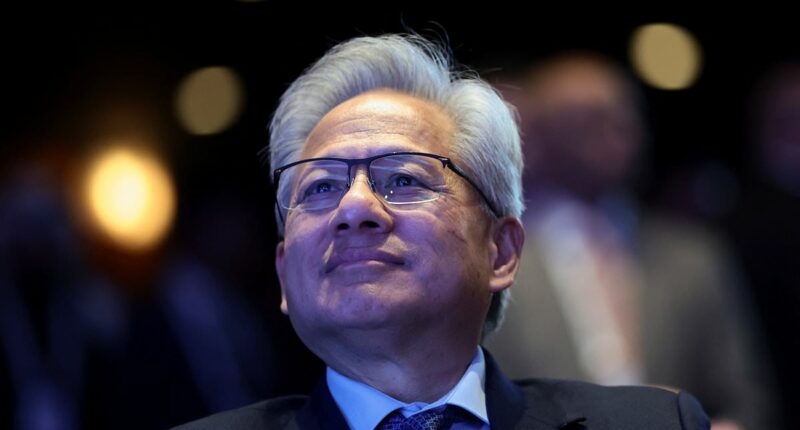Share this @internewscast.com
Nvidia’s recent earnings report has sparked a wave of optimism, but it’s important to take a closer look at the underlying realities. While CEO Jensen Huang continues to project confidence about the company’s trajectory, there are growing concerns that the enthusiasm surrounding the artificial intelligence (AI) revolution may be overly inflated.
Beyond the positive headlines detailing strong third-quarter earnings and an encouraging outlook for the year’s end, it’s crucial to scrutinize the financial mechanics supporting the $4.7 trillion valuation of this AI juggernaut.
A significant factor that cannot be ignored is the massive investment in AI and data center initiatives by tech giants like Meta (Facebook’s parent company), Microsoft, Amazon, Google, and Oracle. These investments play a pivotal role in buoying Wall Street and stock markets.
However, a substantial portion of these multi-billion-dollar investments is funded through off-balance sheet debt. This strategy, while helping to maintain stellar credit ratings and high share prices, raises important questions about the sustainability of such financial practices.
Many of these multi-billion investments, driving Wall Street and equities, are financed by off-balance sheet debt.
Notionally, such arrangements help preserve top-notch credit ratings and keep share prices high.

AI leader: Despite the eternal optimism of Nvidia chief exec Jensen Huang (pictured), there is worry that markets have overhyped the artificial intelligence revolution
Many of the incestuous AI deals and much of the investment in vast data centres is being financed through Business Development Companies, in swollen private credit markets, largely beyond the reach of banking and financial enforcers.
Among firms stumping up are Apollo, Blackstone and Goldman Sachs’ private-credit arm, which have built special-purpose vehicles for the revolution.
Morgan Stanley estimates the debt needed to fund data centres alone will exceed $1 trillion by 2028.
The US investment banking giant has produced an infographic illustrating the overlapping and complex inter-relationships among the AI pioneers and their backers. Larry Ellison’s software giant Oracle is at the vortex of much of this.
It is to take on $18billion of additional debt to build data centres. But it is estimated that it will need to borrow up to $25billion or more a year over the next four years to achieve its ambition. Among the uncertainties is where the power and grid support will come from to fuel this expansion.
The need for such heavy borrowing is a result of less than bulging cash flows. S&P has nudged Oracle’s debt ratings close to junk territory.
The shares have been falling and the insurance cost, should Oracle fail to meet interest rate bills, has surged.
All of this has echoes of the sub-prime mortgage market before Lehman Brothers blew up in 2008. There has been much focus on the private credit implosion at First Brands and Tricolor.
AI financing could be a much bigger threat to stock market wealth and stability. The debt-fuelled funding of AI and data centres might prove to be the most brilliant use of leverage and off-balance sheet funding of all time.
Don’t count on it!
Sour taste
Transformation at Unilever goes on apace. Spreads (such as Flora), Lipton’s tea and Magnum ice cream have already been sacrificed.
Chief executive Fernando Fernandez has now set his sights on local brands.
British favourites Marmite, Colman’s and Bovril look set to join the list of disposable products. One would have hoped that Unilever would be a safe harbour for such heritage brands.
Instead, Fernandez is determined to concentrate on food brands such as Hellmann’s and Knorr with global reach, along with fast-growing personal care and beauty offerings.
If products don’t cut through in the US and India, their days may be numbered.
The best Marmite et al can hope for is a UK trade sale. Allowing private equity ghouls to get their hand on these much-loved assets would be sabotage.
Fantasy world
Defending Labour’s record this week, Keir Starmer cited improvements in the cost of living and medical appointments.
He inhabits an alternative universe. Yes, inflation is falling but, at 3.6 per cent, it is way above target. Surging food prices, such as eggs, hit the least well-off hardest.
As for medical appointments, a family member, hospitalised for asthma, received an NHS letter this week informing them that the next appointment at the asthma clinic, due in January, has been cancelled and moved to April.
So much for the £29billion of taxpayer money which Rachel Reeves poured into our beloved NHS last year.
DIY INVESTING PLATFORMS
AJ Bell

AJ Bell
Easy investing and ready-made portfolios
Hargreaves Lansdown

Hargreaves Lansdown
Free fund dealing and investment ideas
interactive investor

interactive investor
Flat-fee investing from £4.99 per month
Freetrade

Freetrade
Investing Isa now free on basic plan
Trading 212
Trading 212
Free share dealing and no account fee
Affiliate links: If you take out a product This is Money may earn a commission. These deals are chosen by our editorial team, as we think they are worth highlighting. This does not affect our editorial independence.
Compare the best investing account for you










